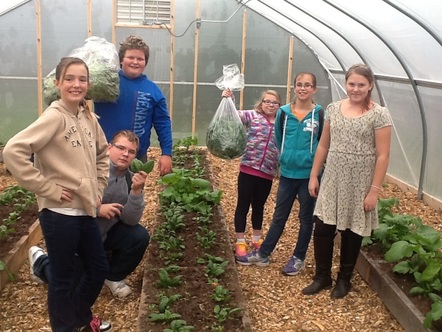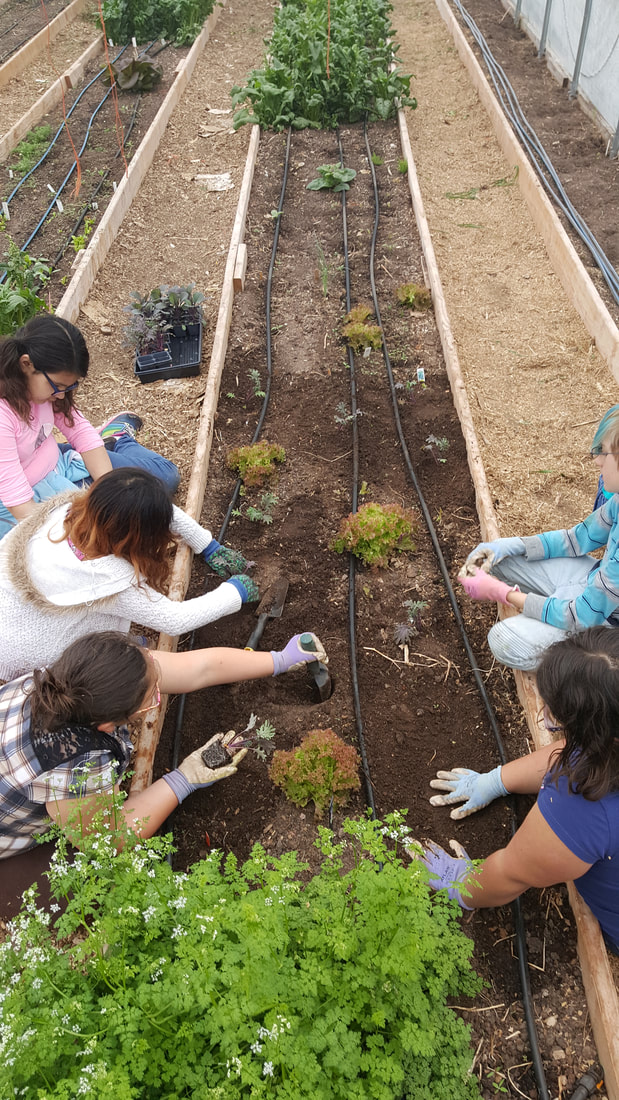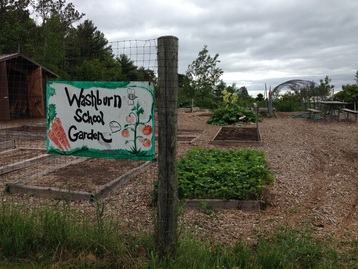When it comes to agriculture education, some programs—like the National FFA Organization— have been in place for decades. Other programs—such as the Farm to School (F2S) program, which emphasizes connections between schools and local farms or greenhouses—have more recently risen to the fore.
“I think the idea of ‘farm-to-school’ has really started to take off in the last 15-20 years,” says Jeff Hicken, an Agriculture, Food, and Natural Resource Consultant at Wisconsin’s Department of Public Instruction (DPI). “It’s being highlighted now more than it has been in the past, and schools are investing in state of the art greenhouses, gardens outside – the ability to produce onsite.”
Created in 2009 by Act 293, the Wisconsin F2S Program supports over 390 local Farm to School and Farm to Early Care (FEC) projects, serving over 500,000 students. The program supports many other local projects as well, like expanded nutrition education, farm field trips, and the creation of school gardens and facilities.
“Essentially, F2S attempts to approach nutrition from a full-circle mindset, inspiring our students to recognize the links between their locality, their culture, their community, and their own individual health,” says Katherine Sorenson, an AmeriCorps Nutrition Educator in Bayfield, WI.
Bayfield is one of three F2S host sites in the Chequamegon Bay region of northern Wisconsin. The regions’ F2S programs—also situated in the Washburn and Ashland School Districts—are thriving.
Formally beginning in 2008, the Chequamegon Bay program continues to grow and expand its partnerships and available resources. Though the program didn't officially exist prior to 2008, F.E.A.S.T by the Bay—a website which houses information on the area F2S program—notes that the “core values of farm-to-school have been celebrated informally in our region for generations, from buying local apples for the cafeteria to starting seeds in a classroom or taking students on a field trip to a local farm.”

Now maintained by teachers, principals, University of Wisconsin-Extension faculty, and a handful of AmeriCorps Vista employees, the Chequamegon Bay sites are closely tied through their exchanges of produce and of lesson plans, as well as their shared equipment: blender bikes, an apple press, and a maple sap boiler. Each site has a school garden and high tunnels (used to grow produce throughout the year). The size and use of each garden vary.
In the past year, according to Kara Helget, a Nutrition Education Consultant for the statewide F2S Program, the Chequamegon Bay program has introduced 48 local foods during taste test activities, engaged over 121 volunteers, and facilitated over 15 farmer-school engagements.
Outside of producing their own fruits and veggies on-site and sharing resources with each other, the sites have partnered with farmers in the area, as well as the local food co-op and dairy.
“It’s about creating food security and trying to close the achievement gap,” says Greta Kochevar, Family and Consumer Science (FCS) teacher in Washburn. “Food is such an important part of a person’s wellbeing; I want all of our students to have access to healthy foods.”

Kochevar, who has been involved with the program since 2009, observes the impact that the program has on the older students who have been a part of the program since they entered school and emphasizes the importance of sustained education. In other words, changes don’t happen overnight.
“Our students are offered a salad bar with a lot of variety, and the kids I eat lunch with have just massive piles of veggies on their plates,” says Kochevar. “I think that we’re now really starting to see the impact, seeing how kids who’ve grown up with these programs have been affected.”
Kochevar also works to oversee the ‘Agripreneur’ program, which allows a few students per year to farm a portion of the substantial Washburn school garden facility during the summer and sell what they grow. The program allows them to hone their agriculture skills while gaining business experience.
Though passing along agricultural skills and providing access to healthy foods are crucial aspects of the program, the impact of agriculture education goes deeper. For educators in the area, F2S is a way of expanding the classroom, the curricula, and teaching traditional subjects in a more hands-on and engaging manner.

From helping elementary students plant and harvest crops to tapping maple trees and boiling sap, students are given a multitude of opportunities to get out of the classroom and become more familiar with the world around them. Not only are young students getting excited about foods like beets and kale, they’re also getting excited about learning.
“The boundaries of the definition of a traditional education are constantly shifting,” says Sorenson. “As educators recognize the existence of varied learning and teaching styles, we are capable of incorporating a larger thematic milieu onto the basic subjects taught in most public schools.”
Brigid Reina, another AmeriCorps Vista employee located in the Washburn School District echoes this sentiment, remarking that traditional subjects and garden lessons blend together organically. “Students use science to care for plants and understand their growth, reading and math to follow a recipe or instructions on seed packets to plant garden rows, and history to mimic age-old Native American planting techniques or to learn about different dishes from around the world.”
And these approaches to pedagogy work. Teachers and AmeriCorps members alike speak passionately about how calming it is for students to be in the garden and how they’ve watched students get excited about subjects they otherwise find boring.
“We have seen incredible impacts on our students,” said Al Krause, principal of Washburn Elementary. “It may be seemingly simple things like enhanced knowledge of plants and their life cycles or something more substantial, such as the effects on students with social and emotional difficulties who find our garden spaces calming and reflective.”